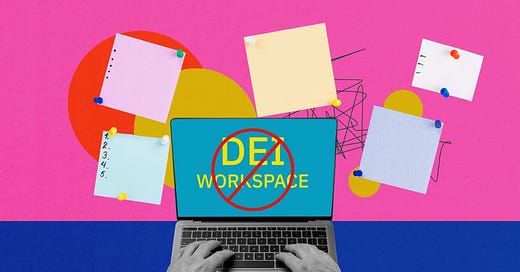DEI isn't dead - but it needs a rethink
A response to Stacey Abrams, and a case for less politics, more clarity in the workplace
At a recent NYU event, Stacey Abrams claimed that the backlash against DEI is part of a coordinated effort to roll back “249 years of progress.” She painted critics of DEI as regressive, even dangerous. It’s a strong message—but it misses the mark.
Here’s what’s actually happening: DEI isn’t being “demonized.” It’s being questioned—and for good reason.
What began as an effort to expand opportunity has evolved into something far more rigid and ideological. Many organizations implemented DEI initiatives in good faith, only to find themselves dealing with new forms of division, unclear ROI, and a climate where honest dialogue feels risky.
Let’s be clear: Most people aren’t pushing back on diversity itself. They’re pushing back on the dogma.
What the Pushback Is Really About
The conversation Abrams wants to frame as anti-equality is, in reality, a call for balance:
Are we hiring and promoting based on merit—or to fulfill demographic optics?
Are DEI trainings actually changing behavior—or just checking boxes?
Are we fostering inclusion—or breeding resentment?
These aren’t dangerous questions. They’re responsible ones. Yet DEI advocates often respond with outrage instead of engagement.
Companies Aren’t Abandoning Inclusion—They’re Recalibrating
The narrative that DEI is being “rolled back” isn’t entirely accurate. Many companies aren’t eliminating inclusion efforts—they’re reassessing them.
They’re asking:
How do we make this work without alienating our teams?
How do we build trust without preaching?
How do we support all employees—without sorting them by grievance group?
Scaling back isn’t surrender. It’s maturity.
What Progress Should Actually Look Like
Abrams defines progress in terms of compliance, policy, and symbolism. But many of us define it differently:
Open dialogue without fear
Clear standards for performance
A workplace where people are seen as individuals—not identity checkboxes
This is the kind of progress that sticks. The kind that builds strong cultures, not just “diverse” ones on paper.
Final Thought
DEI isn’t dead. But it is overdue for recalibration.
We can still pursue fairness, opportunity, and representation—but we need to do it with more clarity, more humility, and far less political theater.
If that makes me part of the “backlash,” so be it. But I’d argue it’s just common sense—and more aligned with the real-world workplace than the talking points coming out of NYU
.




